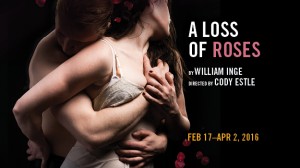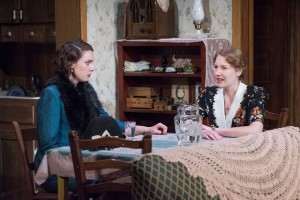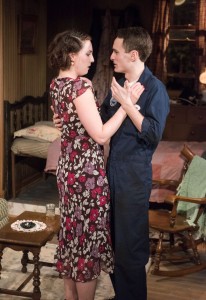
 Highly Recommended **** William Inge is one of my favorite playwrights. I, for one have history that involves one of his classic plays, “Bus Stop”. I was a student at The Goodman Theatre School, back when it was a part of the Art Institute. This was 1960. While I was an aspiring actor, I was also 265 pounds, thus, at 18, I was playing character roles and fathers. I wanted more than anything to do the role of Bo Decker, the cowboy in “Bus Stop” as a studio performance. I gave a solid reading, and the director advised me that he would indeed assign the role to me, on one condition. The condition was that be performance date, some 120 days in the future, I could fit into a size 34 pair of jeans. I worked hard and completed my task, and while I am not at that weight in my 70’s, I have never reached those big belly numbers again, so I thank Mr. Inge on a daily basis. The current production, a William Inge play of that era, but one very few people have ever seen, now on the stage at The Raven Theatre’s West Stage, ” A Loss of Roses” is a deep story as well. Mr Inge is known for his in-depth character study and this play, just like his others, “Bus Stop”, “Come Back, Little Sheba”, “Picnic”, “Dark At The Top Of The Stairs” and “Splendor in The Grass” which as a film starred Warren Beatty (who got his start in this play on Broadway).
Highly Recommended **** William Inge is one of my favorite playwrights. I, for one have history that involves one of his classic plays, “Bus Stop”. I was a student at The Goodman Theatre School, back when it was a part of the Art Institute. This was 1960. While I was an aspiring actor, I was also 265 pounds, thus, at 18, I was playing character roles and fathers. I wanted more than anything to do the role of Bo Decker, the cowboy in “Bus Stop” as a studio performance. I gave a solid reading, and the director advised me that he would indeed assign the role to me, on one condition. The condition was that be performance date, some 120 days in the future, I could fit into a size 34 pair of jeans. I worked hard and completed my task, and while I am not at that weight in my 70’s, I have never reached those big belly numbers again, so I thank Mr. Inge on a daily basis. The current production, a William Inge play of that era, but one very few people have ever seen, now on the stage at The Raven Theatre’s West Stage, ” A Loss of Roses” is a deep story as well. Mr Inge is known for his in-depth character study and this play, just like his others, “Bus Stop”, “Come Back, Little Sheba”, “Picnic”, “Dark At The Top Of The Stairs” and “Splendor in The Grass” which as a film starred Warren Beatty (who got his start in this play on Broadway).
When you walk into the smaller of the two stages at The Raven, on Clark and Granville in Rogers Park, the set (an amazing one by Jeffrey D. Kmiec) makes you feel that you are truly in a small rural town in Kansas. The time of this story is the 1930’s, and the depression has put the United States in rough times. Mrs. Helen Baird (a divine performance by Abigail Boucher), a widow and her 21 year old son, Kenny (deftly handled by Sam Hubbard), are doing the best they can during these times. Helen has gone back to work, as a nurse, since her husband’s passing. Kenny works as an auto mechanic, general labor in a filling station. Back in those days, service stations, you may recall did it all (except sell groceries). Helen is a church-going woman tending to her only son, and Kenny feels that now that he is 21 it should be his responsibility to take care of the expenses while his mother takes care of him.
On this particular morning, Helen tells Kenny that an old friend, one who he grew up calling “Aunt”Lila (a powerful performance by Eliza Stoughton), who was her helper as a teen and has now become an unemployed actress with no place to live, is coming to stay with them. Kenny has given up his room so that his “aunt” can have the privacy a woman of her stature deserves. In many ways, what follows is sort of a “coming of age” story for Kenny, as this young man finds himself caught in a web of make- believe and love (or is it lust?).
Lila, we find out, as a young woman has herself made many mistakes in her life and it appears that her choices along the way have not been as solid as one might think they could have been. I do not want to give away the story line, but there is a major love affair between the young lad and the woman who as a girl changed his diapers and gave him his bottle. What goes on between them is far different and each appears to be confused about what life has in store for them. Lila’s acting troupe dropped her off on the way to the lively Kansas City so we meet some other actors who also lost their jobs. Nice jobs by Antonio Zhiurinskas, Joel Reitsma as Lila’s boyfriend and Barbara Roeder Harris in these roles. The other character in the story is Kenny’s best friend and neighbor Ronny (well done by Lane Flores).
What we learn about Lila during the story is that she certainly did make some huge errors in judgement along her path and before the play ends, will make even more. What we do not learn, and I felt there was something missing, was if she had a relationship with Kenneth, Kenny’s dad during her youth. Does young Kenny remind her of the man she had once loved? There is a photo on the wall that she glances at as she goes about her daily business. Seems to me there was an underlying story that we never get to hear. Directed by Cody Estle, this is a smooth production that allows the audience to get to know each of the characters. He has controlled the love scenes so that no one can be offended. They are very real, and honest.
The technical aspects of the production are flawless. The set is divine and looks as it would during the time and location. Greg Hofmann’s lighting is ideal and the props (Mary O’Dowd) are sheer perfection. The costumes (Alexia Rutherford) appear to be 1930’s for sure and the sound and music (Christopher Kriz) are fitting. David Woolley handles the fight choreography which looked very real, and I was three rows from the action. The running time of this two act play including intermission is 2 hours and 30 minutes. FYI- we do not find out exactly what the title means until almost the end of the play, but once you hear the little story , it will make sense.
“A Loss of Roses” will continue at The Raven Theatre located at 6157 N. Clark Street (they do have a small parking lot and there is street parking) through April 2nd with performances as follows:
Fridays 8 p.m.
Saturdays 3:30 p.m. and 8 p.m.
Sundays 3:30 p.m.
NO show on February 25th
Tickets are $42 (open seating) and $37 for seniors. If you purchase the tickets in advance on-line they will cost you $39 and $34- students/teachers/military $18 Call 773-338-2177 or visit www.raventheatre.com
To see what others are saying, visit www.theatreinchicago.com , go to Review Round-Up and click at “A Loss of Roses”








More Stories
“The Magic School Bus: Lost in the Solar System”
“February House” reviewed by Julia W. Rath
” A Lie of The Mind”